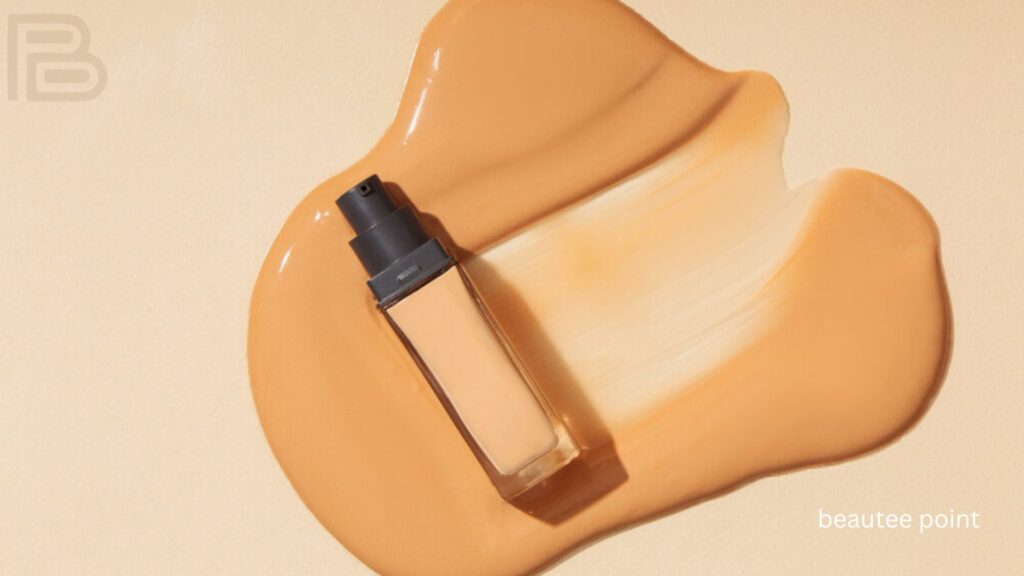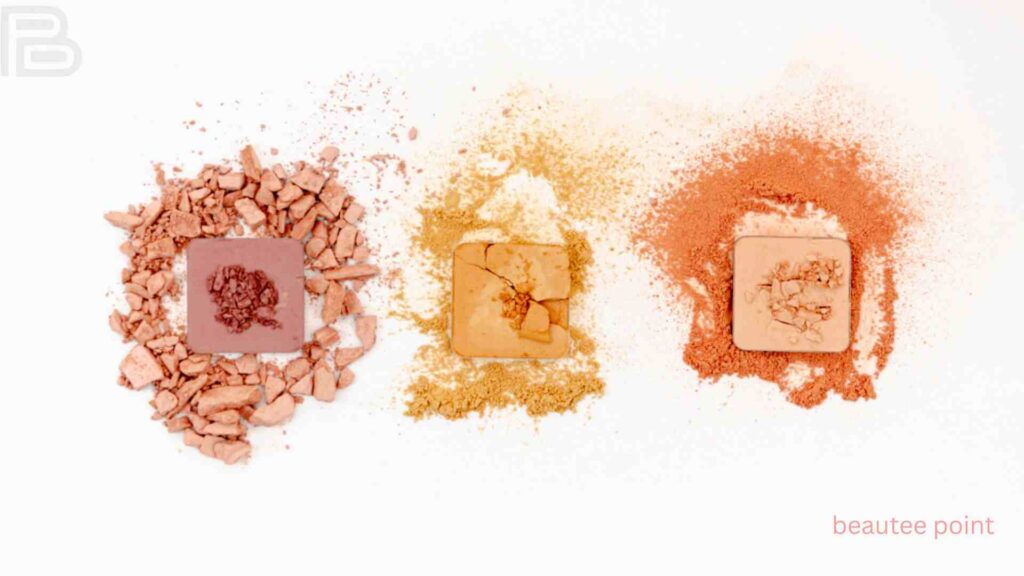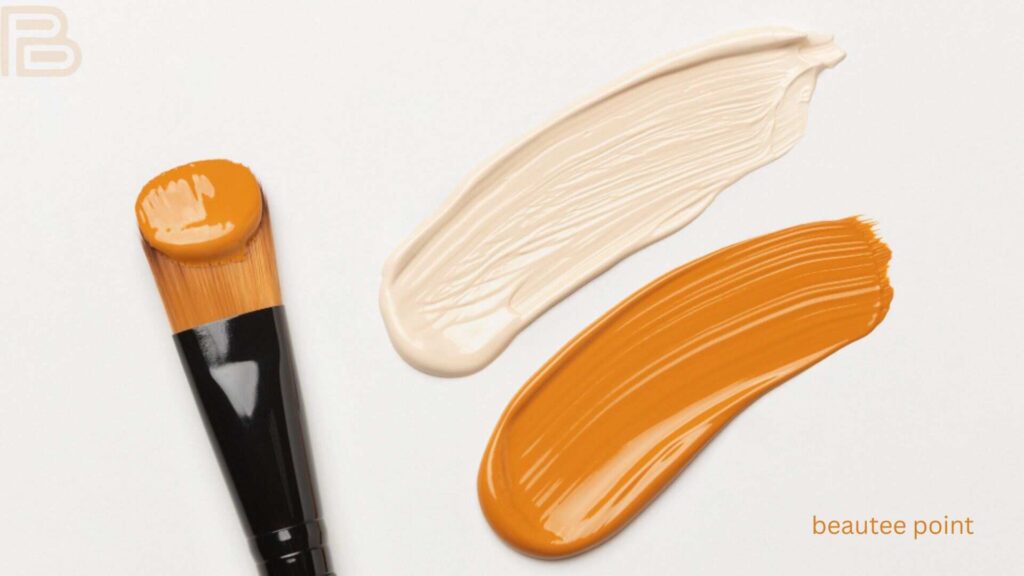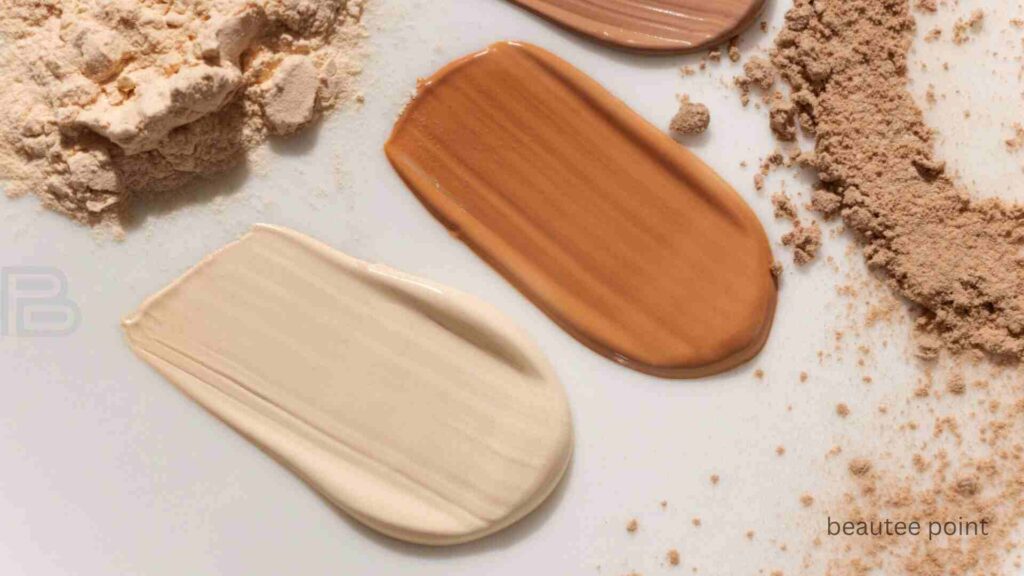Whether it’s a daily routine or an important event, makeup is an essential part of our lives, and foundation serves as the cornerstone for our makeup. It makes the skin smooth, flawless, and balanced.
If you are unfamiliar with this product, we will provide a detailed explanation of what the foundation is and its role in makeup. And why it is essential.
In this guide, we’ll walk you through the types, functions, finishes, coverage levels, and uses so you can confidently choose the perfect product for your skin.
If you always want to look beautiful and fresh, this article is for you.

What is a Foundation in makeup?
As we have mentioned, the foundation is the cornerstone of makeup. It creates a flawless, smooth base for makeup application and enhances its longevity throughout the day.
It conceals blemishes, redness, dark spots, and other imperfections while enhancing the skin’s natural tone to create a radiant and fresh appearance.
Applying it is very important for those who love makeup.
A Brief History of the Foundation
Makeup has been used for thousands of years to enhance facial beauty and is even mentioned in the Bible.
In 200 BC, Greek women used white lead and chalk as makeup to enhance their beauty.
Ancient Roman women also used white lead to enhance their beauty. These beauty practices weren’t limited to women alone, but also by ancient Roman men to improve their appearance and showcase their social status.
Middle Ages and Renaissance Trends
Even in the Middle Ages, makeup was used to look beautiful. People associated white and radiant skin with wealth and high status, and a dark complexion was considered a sign of poverty and destitution.
During the Italian Renaissance, women used lead paint to enhance their beauty, which was extremely dangerous and very harmful to their health.
In the 17th century, during the reign of Queen Elizabeth, women used a mixture of vinegar and white lead as makeup, which was extremely dangerous.
18th and 19th Century Beauty Standards
In the 18th century, makeup was commonly worn by both women and men. They used a lot of white base.
In the Victorian era, makeup was associated with actresses and women of ill repute, leading respectable women to avoid it.
In the Edwardian era, women used light greasepaint.
The Birth of Modern Foundation
German theater actor Karl Bauden founded the modern product. He created a unique thing that gained popularity and remained popular for many years.
Still, in 1914, the famous makeup artist “Max Factor” invented Flexible Greasepaint, a great innovation.
Read More: 10 Pro-Level Tips to Choose the Best Foundation for Dry Skin
8 Types of foundations based on their formula
Foundation acts as a base for makeup. It smooths the skin and makes makeup durable and long-lasting. There are many base makeup options available for different skin types.
In this guide, we will explain the different types and their features in detail so that you can choose a suitable product for your skin.
Liquid foundation
Suitable for: All types of skin
Coverage: Light to full
Finish: Matte, satin, dewy, or stain
It is suitable for all skin types. Its formula combines water, silicone, and oil, allowing for easily buildable coverage.

An oil-free liquid base works best for oily skin, while a hydrating base is ideal for dry skin.

Powder foundation:
Suitable for: Oily skin
Coverage: Light to medium
Finish: Matte
The primary purpose of this product is to absorb excess oil, reducing facial shine and keeping the skin looking fresh throughout the day.
Its use makes the Skin feel natural and light.

Powder makeup base is not suitable for dry and sensitive skin because it absorbs into the skin’s lines.
Cream Foundation:
Suitable for: Dry skin
Coverage: Medium to full
Finish: Satin
The primary function of this product is to provide hydration and nourishment to dry skin.
It is soft, hydrating, and glides smoothly onto the skin.

To make the cream foundation last longer, apply a light translucent powder to the skin.
Mousse Foundation:
Mousse Foundation:
Suitable for: Normal to oily
Coverage: Light to medium
Finish: Matte
Mousse formula helps eliminate shine for a matte finish. Its structure is light and soft. It feels very smooth on the skin and gives a soothing matte finish.

To get an airbrushed effect, apply it with a stippling brush
Serum Foundation:
Suitable for: All types of skin
Coverage: Sheer to medium
Finish: Nature
Serum-based formula is packed with skin-protecting ingredients.. It keeps the skin fresh and feels very light. It provides extra hydration.

Shake the bottle well before use to ensure the serum and pigment blend evenly.
Stick Foundation:
Suitable for: Normal to oily skin
Coverage: Medium to full
Finish: Satin
It’s easy to apply to the skin thanks to its high pigment concentration. It is also very convenient to use while traveling.

The stick formula gives a more natural look when blended with a damp sponge blender.
Cushion Foundation:
Suitable for: Dry skin
Coverage: Sheer to medium
Finish: Natural
The cushion formula is popular worldwide for its ease of use. It is a Korean beauty invention that makes the skin fresh and radiant.
It comes in a compact that contains a sponge filled with liquid base, through which it can be easily applied with a puff applicator.

Cushion formula is the best choice for a lightweight, dewy look.
Mineral Foundation:
Suitable for: Acne-prone skin
Coverage: Light to medium
Finish: Natural
This mineral-based formula features natural ingredients like zinc oxide and titanium dioxide, which help soothe sensitive and irritated skin. Zinc oxide also provides natural sun protection.
It is gentle on the skin and does not block skin pores. Moreover, it delivers a feather-light sensation that allows your skin to breathe naturally, keeping it fresh and comfortable throughout the day.

Mineral-based makeup is ideal for sensitive skin, providing a natural finish with gentle, skin-loving ingredients.
Read More: Best Foundation For Aging Skin Over 50
4 Types of foundations based on their coverage
The ability of a base product to hide skin imperfections is referred to as its coverage.
Sheer Coverage
- Best for a natural no-makeup look
- Just even out skin tone
- Common in BB creams and tinted moisturizers
Light Coverage
- Slightly more coverage than sheer coverage
- Best for daily use
- Layers can be added as needed
Medium Coverage
- Hides little blemishes and redness
- Maintains a natural look
- Suitable for both day and night
Full Coverage
- Perfectly conceals blemishes and hyperpigmentation
- Gives a flawless and airbrushed look
- Perfect for occasions like weddings or photo shoots

Apply full-coverage base makeup in thin layers to prevent a cakey appearance.
5 Types of foundations based on their finish
Matte
- Best for oily and combination skin
- Reduces shine and gives a smooth, velvety look
- Long-lasting and oil-controlling
Dewy
- Best for dry and aging skin
- Gives a radiant and hydrated look
- Contains moisturizing ingredients
Satin
- The balance between Matte and Dewy
- Suitable for all skin types
- Gives a slight natural glow
Luminous
- More glow and light reflecting
- Perfect for parties or events
- Gives a more glamorous look with highlighter
Natural Finish
- Bulky and natural look
- Suitable for all skin types
- Perfect for everyday use
Selecting the Best Foundation Based on Your Skin Type
Choosing the right product can be challenging, but understanding your skin makes it much easier to find the best match for you.
In this guide, we will tell you how to choose the best makeup base for your skin.
For oily skin
Oily skin produces excess oil, which can cause makeup to run or look shiny.
What you should look for
- Matte or oil-free formulas that control shine.
- Lightweight options such as powder or oil-free liquids.
- Products labeled long-wearing or shine control.

Finally, apply a setting powder or matte setting spray to set the base.
For dry skin
Dry skin tends to be rough, so moisturizing formulas are best for it.
What you should look for
- Hydrating liquid or cream formulas
- Products with a dewy or satin finish
- Formulas that contain hyaluronic acid or glycerin

Apply a moisturizer and hydrating primer to your skin before Makeup base.
For combination skin
Skin that is partly oily and partly dry is called combination skin.
What you should look for
- Balancing or semi-matte formulas that work for both areas.
- Flexible liquids with buildable coverage.

Use a matte primer on oily areas and a hydrating primer on dry areas.
For sensitive skin
Skin that is easily susceptible to allergies or irritation is referred to as sensitive skin.
What you should look for
- Bioallergenic and fragrance-free base.
- Mineral-based or formulas designed specifically for sensitive skin
- Non-comedogenic products that don’t clog pores

Before using a new foundation, test it on your wrist or Lower face.
For Normal Skin
Skin that is neither too oily nor too dry is called normal skin.
What you should look for
- Almost any type of base suits normal skin.
- Try liquid, cream, or stick formulas depending on your preference.
- A natural or satin finish works best.

Experiment with various textures and finishes to discover what suits you best.
Foundation Application Techniques
Applying foundation the right way not only makes your makeup last longer but also protects your skin and creates a flawless finish.
Below are easy and effective makeup base application techniques to help you achieve professional results.
Prep Your Skin
- Skin preparation is essential before applying foundation.
- Cleanse your skin thoroughly so that there is no dust or oil
- Apply a moisturizer according to your skin type
- Apply a primer to help your base last longer and maintain a fresh, radiant appearance.
Choosing the right foundation
- Choose a product according to your skin type
- Choose a foundation that matches your undertone and complexion.
- Choose the fashion of your choice
How to apply foundation
Foundation Brush
Apply with a brush for full coverage
Blend the brush, moving from the center of the face outward

Damp Beauty Sponge
The sponge helps the foundation melt into the skin, creating a natural, airbrushed effect.
Dampen the sponge and blend the foundation in a circular motion.
Fingers
Use fingers to butt and sheer coverage foundation
With the warmth of the fingers, makeup base absorbs better into the skin.
Blend it Well
Blend the foundation up to the neck, jawline, and ears; as a result, there are no lines or blemishes.
Always check in natural light to see if the blending is done correctly
Choose the Right Foundation
For oily skin, use a setting powder to control oil.
Keep makeup fresh and glowing with a setting spray for dry or normal skin.
How to Avoid an Unnatural or Cakey Foundation Look
If your base looks heavy, dry, or cakey, this is a common issue that can be easily avoided with the right techniques and proper preparation.
First, prepare your skin well for applying base. Wash your face, apply moisturizer, and use a good primer. Then choose the best makeup base suited to your skin,
Apply slowly and in small amounts. Using too much will make it look heavy, dry, and cakey. Blend it well.
Apply it gently all over the face with a wet beauty blender or soft brush, therefore, lines do not form. Do not use too much powder.
To keep your makeup looking fresh and natural, finish with a setting spray. Remember, the secret to flawless, natural-looking makeup is simple: use less foundation, blend well, and choose the right products for your skin.
Benefits of the Foundation:
Even Out Skin Tone
Hides skin roughness, creates a smooth base, and evens out skin tone
Offers Light, Medium, or Full Coverage
Depending on your needs, you can choose light, medium, or full-coverage makeup base.
Skincare
SPF base with hydrating formulas and anti-aging ingredients help protect and care for your skin.
Acts as a Long-Lasting Makeup Base
It creates an excellent base that makes makeup last longer and more durable.
Controls Oil and Reduces Shine
A matte-finish makeup base is ideal for oily skin as it reduces shine and gives the skin a smooth, velvety finish.
Provides a Dewy Glow for Dry Skin
Dewey or hydrating base refreshes and brightens dry or mature skin.
Minimizes the Appearance of Pores and Fine Lines
A pore-minimizing base reduces pores and fine lines, leaving your skin looking younger and smoother.
Protects Against Sun and Pollution
Many bases contain SPF protection and anti-pollution ingredients that protect your skin from ultraviolet rays and environmental pollution.
Increases confidence
A beautiful base boosts your confidence, whether you’re in the office. In front of the camera or at a special event.
Perfect for Any Makeup Look
The foundation is perfect for every look, from natural makeup looks to full glam makeup.
Covers Dark Spots and Blemishes
Blemishes, acne scars, and hyperpigmentation can be easily covered with a color-correcting or concealer-base combo.
Buildable Formula for Custom Coverage
Many buildable bases can feel cakey yet still don’t provide the coverage you need.
Pigments in Foundation: How They Affect Your Skin Tone
What Are Pigments?
Pigments are tiny colored particles added to the makeup base to create different shades. If the base did not contain pigments, it would have no color.

Types of Pigments Used in Foundation
Most makeup bases contain these pigments.
Iron Oxides (for warm and brown shades)
Titanium Dioxide (to increase SPF and brightening effect)
Ultramarines (for adding blue or purple tones in cool or neutral shades)Mica (for a soft glow or shimmer in base)
Why Are Pigments Important?
The natural or unnatural look of a base depends on its pigment level and how well it matches your skin tone. If the base matches the undertone, the face looks natural and fresh.
How Pigments Affect Coverage
A higher pigment concentration results in a full-coverage base that effectively conceals blemishes and discoloration.
Sheer or light coverage foundations contain fewer pigments, providing a softer, more natural look.
How to Pick the Right Shade?
The wrong foundation shade can make your skin look orange-gray or lifeless. That’s why it’s essential to test base in natural light and choose a shade that blends seamlessly with your skin tone and neck.

Best Tips to Choose the Right Foundation Shade
Choosing the right foundation shade is key to achieving a flawless, natural-looking makeup finish. First, understand your skin’s undertone (warm, cool, neutral).
If your skin is yellow or golden, your undertone is warm. Pink or blue skin has a cool undertone. If there is a balance between the two, the undertone is neutral.
Test the base on your cheekbone and check it in natural light to see the true shade.
Also, keep in mind your skin type, which is described above.
Keep in mind that your foundation shade may vary with the seasons; lighter tones work better in winter, while deeper shades suit summer skin tones.

If you can’t find an exact shade, you can mix two foundation tones to get the best color.
Conclusion:
Now you know what the foundation is in makeup. It’s not just a base. It’s the secret to achieving a fresh and natural look.
The right product, whether liquid, powder, or cream, will perfectly match your skin tone and type.
Choosing the right shade and applying it correctly will help you achieve a flawless, natural finish every time. It boosts your confidence and enhances the rest of your makeup.
Remember, a great makeup look always starts with the right base!
What is the foundation used for in makeup?
The foundation is used to create an even skin tone, cover imperfections as blemishes and redness, and provide your face with a smooth base for the rest of your makeup.
How do I know my foundation shade?
Test foundation shades on your jawline in natural light. The shade that blends into your skin without leaving a line is your best match.
Which type of foundation is best for oily skin?
For oily skin, matte or oil-free liquid foundations and powder foundations are ideal as they help to control shine and maintain their hold for a longer duration.
Can I wear a foundation every day?
Yes! You can wear foundation daily if you choose one that suits your skin type and contains skin-friendly ingredients, such as hydrating or oil-control formulas.
What’s the difference between foundation and concealer?
Foundation evens out your overall skin tone, while concealer covers specific problem areas like dark circles or pimples.
Should I apply primer before the foundation?
Yes, applying primer helps smooth your skin’s texture, minimizes pores, and helps your foundation last longer.
How can I prevent my foundation from looking cakey?
Use a lightweight formula, apply in thin layers, and blend well. Also, always moisturize your skin before applying foundation.


2 thoughts on “What is Foundation in Makeup? 12 Powerful Tips for a flawless Look”